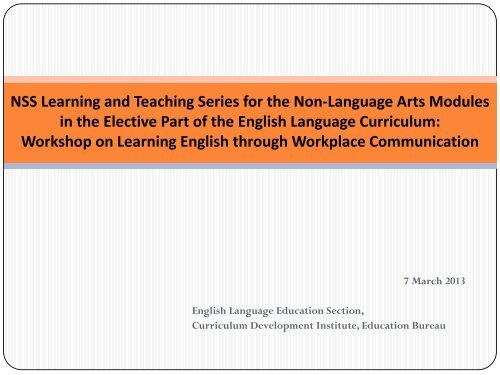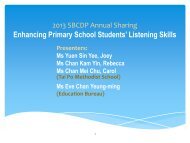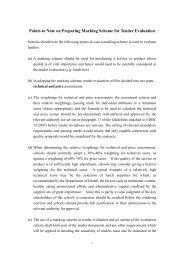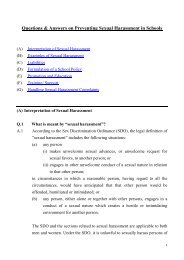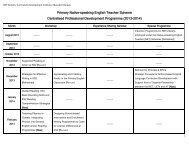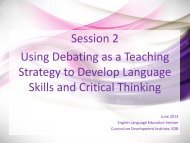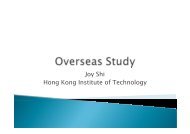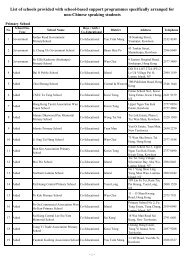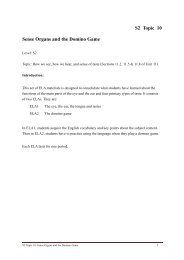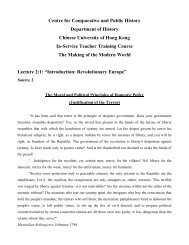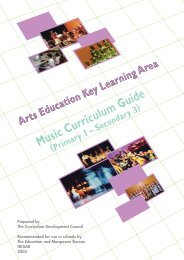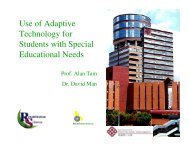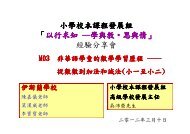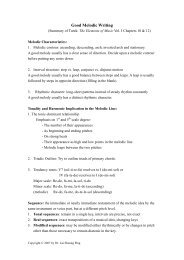text-types
text-types
text-types
You also want an ePaper? Increase the reach of your titles
YUMPU automatically turns print PDFs into web optimized ePapers that Google loves.
NSS Learning and Teaching Series for the Non-Language Arts Modules<br />
in the Elective Part of the English Language Curriculum:<br />
Workshop on Learning English through Workplace Communication<br />
7 March 2013<br />
English Language Education Section,<br />
Curriculum Development Institute, Education Bureau
• a better understanding of the module ‘Learning English<br />
through Workplace Communication’ in the Elective Part<br />
of the three-year senior secondary English Language<br />
curriculum;<br />
• gained some ideas on how to plan the module, in<br />
particular how it could be integrated with the<br />
Compulsory Part using the task-based approach for<br />
extending students’ knowledge of <strong>text</strong>-<strong>types</strong> prominent<br />
in daily life as well as skills for comprehension and<br />
production of similar <strong>text</strong>s;<br />
2
• learnt more about how to develop learning and<br />
teaching activities/materials for the<br />
implementation of the module;<br />
• acquired some strategies for teaching the module<br />
and the use of assignments, assessment and<br />
feedback for improving learning and teaching; and<br />
• shared your experience in planning/implementing<br />
the module or related learning and teaching<br />
activities with other participants.<br />
3
Part 1<br />
Part 2<br />
Understanding the module<br />
Designing workplace-related classroom activities<br />
BREAK<br />
Part 3 Possible approaches to implementing the module<br />
LUNCH (12.30-13.45)<br />
Part 4 Strategies in planning and implementing the module<br />
Part 5 Assessing students’ learning in the module: Part 1<br />
BREAK<br />
Part 6 Assessing students’ learning in the module: Part 2<br />
4
Ask three of the participants who are not in your group<br />
the following questions:<br />
1. What is your name?<br />
2. Which school are you from?<br />
3. Does your school offer “Workplace Communication”<br />
as one of the elective modules? Why/Why not?<br />
4. Why do you attend this workshop?
Which of the following picture/diagram do you think best<br />
illustrates the relationship between the Compulsory Part<br />
and the Elective Part? Explain your choice.<br />
7
• provide opportunities for learners to apply,<br />
consolidate and extend the language knowledge<br />
and skills that they have acquired from the<br />
Compulsory Part<br />
• cater for learners’ diverse abilities, needs and<br />
interests<br />
• extend and enrich learners’ learning experience<br />
• add variety to the language curriculum<br />
8
Activity 1: What are the overall objectives of the module<br />
‘Learning English through Workplace Communication’?<br />
9
Activity 1: What are the overall objectives of the module<br />
‘Learning English through Workplace Communication’?<br />
• To familiarise learners with different <strong>types</strong> of workplace<br />
correspondence<br />
• To develop learners’ understanding of the vocabulary,<br />
language, formats, styles and conventions used in spoken<br />
and written communication in the workplace<br />
• To help learners to apply the knowledge and skills they<br />
have learned in their production of workplace-related <strong>text</strong>s<br />
• To enhance learners’ ability to carry out workplace-related<br />
activities through providing them with opportunities to<br />
practise and demonstrate their language and<br />
communication skills in simulated tasks<br />
10
Suggested learning focuses of the module<br />
(from the Suggested Schemes of Work for the Elective part of<br />
the Three-year Senior Secondary English Language Curriculum)<br />
Suggested no. of lessons: 50<br />
•Building knowledge and vocabulary of different trades/businesses<br />
•Starting a scrapbook of a selected trade/business<br />
•Concepts relating to organisations<br />
•Handling business telephone calls<br />
•Memo writing<br />
•Conventions and style of business letters<br />
•Handling complaints<br />
•Planning the final project<br />
11
Suggested learning focuses of the module<br />
(from the Suggested Schemes of Work for the Elective part of<br />
the Three-year Senior Secondary English Language Curriculum)<br />
•Making sales presentations<br />
•Producing sales/promotional materials<br />
•Setting up and holding meetings, and preparing minutes<br />
•Job interviews<br />
•Quiz on general business knowledge<br />
•Sharing ideas on business ethic<br />
•Final display<br />
12
Target knowledge, skills and attitudes<br />
Students are able to:<br />
• Understand English telephone etiquette<br />
• Handle telephone calls in a professional manner<br />
• Apply strategies of establishing and maintaining<br />
relationships in telephone English<br />
13
Target knowledge, skills and attitudes<br />
Students are able to:<br />
• write memos in English<br />
• demonstrate an understanding of the need to be<br />
succinct in memo writing<br />
• understand and apply strategies of politeness<br />
and tact<br />
14
Activity 2a<br />
In your group,<br />
a) write down as many <strong>text</strong>-<strong>types</strong> as<br />
you can think of that are related<br />
to workplace communication;<br />
b) circle the <strong>text</strong>-type that you hear;<br />
and<br />
c) raise your hand when you have<br />
circled 4 <strong>text</strong>-<strong>types</strong> in a row!<br />
16
Activity 2b<br />
Which of the following are SPOKEN <strong>text</strong>-<strong>types</strong> and which of them<br />
are WRITTEN <strong>text</strong>-<strong>types</strong>? Circle the SPOKEN <strong>text</strong>-<strong>types</strong> below.<br />
memo resume webpage<br />
note/message<br />
formal letter<br />
conversation/<br />
telephone conversation<br />
email advertisement form/table/chart<br />
agenda proposal meeting/discussion<br />
minutes survey/report article<br />
interview<br />
public speech /<br />
presentation<br />
pamphlet/leaflet/<br />
flyer/poster<br />
17
• The <strong>text</strong>-<strong>types</strong> that I have circled above could be<br />
used to help develop my students’ speaking and<br />
listening skills.<br />
• The <strong>text</strong>-<strong>types</strong> that I have NOT circled above could<br />
be used to help develop my students’ reading and<br />
writing skills.<br />
• To facilitate the development of all the four<br />
language skills, students should be exposed to a<br />
balanced variety of written and spoken <strong>text</strong>-<strong>types</strong>.<br />
18
Different <strong>text</strong>-<strong>types</strong> provide meaningful con<strong>text</strong>s<br />
for the learning and purposeful use of language<br />
knowledge and skills. Conscious learning and<br />
explicit, systematic teaching of different <strong>text</strong>-<strong>types</strong>,<br />
including the features they involve, enable learners<br />
to become more proficient language users.<br />
19
Activity 3a<br />
In both spoken and written <strong>text</strong>-<strong>types</strong> for workplace<br />
communication, formulaic expressions are often used.<br />
What are the language functions of the expressions below?<br />
20
To ask for favour/assistance<br />
Could you please…?<br />
Would you mind ~ing…?<br />
I should be grateful if you would…<br />
I would appreciate it if you could…<br />
To respond to requests/complaints<br />
To make enquiries<br />
May I ask/know…?<br />
I am writing to enquire about…<br />
I should be grateful if you could inform me of…<br />
With reference to your request for…<br />
I am writing in response to your letter…<br />
Should you have any further queries, please do not hesitate to contact…<br />
21
To give a presentation<br />
First of all, …<br />
I would like to conclude with the following suggestions:…<br />
To summarise what I have said,…<br />
To give advice/suggestions<br />
We recommend that…<br />
May I suggest that we…?<br />
Perhaps you could…<br />
To explain a purpose<br />
I am writing to…<br />
The reason I’m calling is that…<br />
The purpose of our meeting today is…<br />
To show agreement/disagreement<br />
You’re absolutely correct.<br />
I’m afraid I cannot agree with you because…<br />
It seems a good idea but maybe we could…<br />
22
Activity 3b<br />
In what ways are expressions softened to<br />
become more polite? Identify three different<br />
ways used in the expressions in Activity 3a.<br />
•using modals (e.g. would, could, may, should)<br />
•using questions instead of direct statements<br />
(e.g. Could you please…?, May I …?)<br />
•using adverbials of probability (e.g. perhaps,<br />
maybe)<br />
23
To enable students to comprehend and produce<br />
a range of spoken and written <strong>text</strong>-<strong>types</strong> related<br />
to workplace communication, it is important to<br />
familiarise students with:<br />
• words/expressions for different language<br />
functions<br />
• the appropriate register (i.e. degree of<br />
formality) for communicating politely<br />
24
Activity 4a<br />
With your partner, brainstorm as many jobs as<br />
you can and list them below.<br />
25
-based on General Social Survey by the National Organization for Research at the<br />
University of Chicago<br />
26
10. elephant dung inspector 5. stage performer’s assistant<br />
9. animal masturbator 4. skyscraper window cleaner<br />
8. animal pregnancy tester 3. sewers cleaner<br />
7. road-kill remover 2. guard at Buckingham Palace<br />
6. carcass cleaner 1. janitor at a dirty theatre<br />
from www. smashinglists.com<br />
27
property agent<br />
tour guide<br />
wedding planner<br />
dancer<br />
veterinarian<br />
yoga instructor<br />
playgroup leader<br />
travel blogger<br />
babysitter<br />
web developer<br />
hair stylist<br />
acupuncturist<br />
cartoonist<br />
nutritionist<br />
herbalist<br />
headhunter<br />
28
Activity 4b<br />
In your group, brainstorm as many work-related<br />
situations as you can in which people with the following<br />
jobs may need to use (i.e. read, write, listen or speak).<br />
Group 1: nurse, tour guide<br />
Group 2: bank teller, web designer<br />
Group 3: chef, waiter/waitress<br />
Group 4: police inspector, customs officer<br />
Group 5: beautician, gym trainer<br />
Group 6: salesperson, ambulance man<br />
29
Example 1 – Singer<br />
With whom? When?<br />
Possible situations:<br />
• talk with overseas investors, counterparts and fans<br />
• attend interviews conducted by English-speaking<br />
media<br />
• attend social gatherings with English-speaking<br />
participants<br />
• sing English songs at special events (and read English<br />
lyrics)<br />
• listen to songs from English-speaking countries<br />
30
Example 2 – Barista at coffee shop<br />
Possible situations:<br />
• reading information of products in English<br />
• introducing products to English-speaking<br />
customers<br />
• listening and responding to the requests or<br />
questions from English-speaking customers<br />
31
Activity 5<br />
Read through the three learning activities given to you<br />
and identify the following:<br />
• Job: ____________________________<br />
• Place of work:<br />
________________________________________<br />
• Purpose of activity: __________________________<br />
• Language skills involved (circle): reading / writing /<br />
listening / speaking<br />
• Text-type(s) involved:<br />
_______________________________________<br />
32
Learning Activity 1<br />
Job: customer service representative<br />
Place of work: Magical Tour Bus Company<br />
Purpose of activity:<br />
to respond to a complaint about<br />
the company’s day trip from an<br />
important client<br />
Language skills involved (circle): reading and writing<br />
Text-type(s) involved: complaint letter, letter of reply<br />
33
Learning Activity 2<br />
Job: concierge<br />
Place of work:<br />
Purpose of activity:<br />
Language skills involved (circle):<br />
Text-type(s) involved:<br />
a five-star hotel in TST<br />
to recommend a well-known Chinese<br />
restaurant to a guest<br />
reading and speaking<br />
webpage and presentation<br />
34
Learning Activity 3<br />
Job: secretary<br />
Place of work: Mavis Company<br />
Purpose of activity:<br />
to write memos to a few<br />
colleagues on behalf of your boss<br />
Language skills involved (circle): listening and writing<br />
Text-type(s) involved: telephone conversation, memo<br />
35
Many tasks in real-life workplace situations<br />
involve the integrative use of language skills and<br />
strategies. Based on these situations, a variety of<br />
learning activities that are relevant to learners’<br />
abilities and interests and cover a range of <strong>text</strong><strong>types</strong><br />
could be designed to facilitate the<br />
integrative use of an extensive range of language<br />
knowledge and skills in the module “Learning<br />
English through Workplace Communication”.<br />
36
While Modules, Units and Tasks are to be adopted for<br />
organising learning and teaching in the Compulsory Part,<br />
the modules in the Elective Part may not necessarily<br />
follow the M-U-T structure. However, the general<br />
approach to teaching the modules in the Elective Part<br />
remains task-based – that is, teachers are encouraged to<br />
continue with the principles and practices associated with<br />
task-based learning, namely using learner-centred<br />
instruction, providing opportunities for meaningful and<br />
purposeful communication and promoting integrative and<br />
creative uses of language.<br />
English Language Curriculum and Assessment Guide (Secondary 4-6), p.54<br />
39
• Provides con<strong>text</strong>s for<br />
– integrated use of language skills<br />
– meaningful and purposeful use of English for<br />
communication<br />
• Facilitates effective grammar learning and<br />
teaching<br />
• Uses learning and teaching resources of a<br />
variety of <strong>text</strong>-<strong>types</strong><br />
• Promotes a learner-centred approach<br />
40
Con<strong>text</strong><br />
Purpose<br />
Involves learners in<br />
thinking and doing<br />
Product<br />
Requires learners to<br />
draw upon a<br />
framework of<br />
knowledge and skills<br />
41
Con<strong>text</strong>?<br />
Purpose?<br />
You are a job seeker. You have enrolled for a course<br />
organised by a career coaching agency which prepares<br />
young people for job seeking. In the course, you will be<br />
trained on how to search for jobs from job ads, apply for<br />
jobs and prepare for job interviews.<br />
Product?<br />
The coach of the course requires you to complete the<br />
following tasks:<br />
1. Searching for a job suitable for yourself<br />
2. Writing a CV and a job application letter<br />
3. Prepare for job interviews<br />
42
Task 1 – Job search<br />
Students have to:<br />
•read sample job ads and learn about their features<br />
•play matching games to understand job duties and requirements<br />
•read job ads from own sources, choose a job that suits them and<br />
explain their choice<br />
Task 2 – Job application<br />
Students have to:<br />
•listen to a presentation about CV writing<br />
•study sample CVs and job application letters<br />
•write a CV<br />
•write a job application letter for the job they have chosen<br />
Task 3 – Job interview<br />
Students have to:<br />
•discuss the possible questions to be asked at job interviews<br />
•prepare written responses to possible questions<br />
•watch video clips on job interview etiquette and skills<br />
•role-play a job interview<br />
43
Task 1 – Job search<br />
Students have to:<br />
•read sample job ads and learn about their features<br />
•play matching games to understand job duties and requirements<br />
•read job ads from own sources, choose a job that suits them and<br />
explain their choice<br />
Task 2 – Job application<br />
Students have to:<br />
•listen to a presentation about CV writing<br />
•study sample CVs and job application letters<br />
•write a CV<br />
•write a job application letter for the job they have chosen<br />
What are the <strong>text</strong>-<strong>types</strong> involved?<br />
Task 3 – Job interview<br />
Students have to:<br />
•discuss the possible questions to be asked at job interviews<br />
•prepare written responses to possible questions<br />
•watch video clips on job interview etiquette and skills<br />
•role-play a job interview<br />
44
Task 1 – Job search<br />
Students have to:<br />
•read sample job ads and learn about their features<br />
•play matching games to understand job duties and requirements<br />
•read job ads from own sources, choose a job that suits them and<br />
explain their choice<br />
Task 2 – Job application<br />
Students have to:<br />
•listen to presentation about CV writing<br />
•study sample CVs and job application letters<br />
•write a CV<br />
•write a job application letter for the job they have chosen<br />
What are the language skills involved?<br />
Task 3 – Job interview<br />
Students have to:<br />
•discuss the possible questions to be asked at job interviews<br />
•prepare written responses to possible questions<br />
•watch video clips on job interview etiquette and skills<br />
•role-play a job interview<br />
45
Task 1 – Job search<br />
Students have to:<br />
•read sample job ads and learn about their features<br />
•play matching games to understand job duties and requirements<br />
•read job ads from own sources, choose a job that suits them and<br />
explain their choice<br />
Task 2 – Job application<br />
Students have to:<br />
•listen to a presentation about CV writing<br />
•study sample CVs and job application letters<br />
•write a CV<br />
•write a job application letter for the job they have chosen<br />
Task 3 – Job interview<br />
Students have to:<br />
What is the language knowledge involved?<br />
•Features of job ads<br />
•Content, language and structure of CVs and<br />
job application letters<br />
•discuss the possible questions to be asked at job interviews<br />
•prepare written responses to possible questions<br />
•watch video clips on job interview etiquette and skills<br />
•role-play a job interview<br />
46
Activity 6<br />
Read the unit overview below and the lesson plan for the unit given to you and fill<br />
in the boxes on your worksheet. Each group member should read the lesson plan<br />
for one of the five tasks and share their ideas in order to complete the table at<br />
the bottom of the worksheet.<br />
Unit: New Face of the Friendly Pet Hotel<br />
You are Chris. You work for the Friendly Pet Hotel in Tsuen Wan,<br />
which provides services mainly for dogs. Recently, your pet hotel<br />
has conducted a customer survey to find out how satisfied the<br />
patrons were with the services provided. The manager, Mr Pat<br />
Smith, has sent you a memo. He wants you to identify the<br />
problems from the patrons’ responses and to make suggestions on<br />
how to improve the hotel services. Write a report on the problems<br />
of the pet hotel and make recommendations to improve the<br />
business.<br />
47
Task 1 • memo<br />
• charts<br />
Text-<strong>types</strong><br />
Language knowledge/skills<br />
Knowledge:<br />
• function and features of a memo<br />
• vocabulary related to services for pets<br />
• quantifiers<br />
Skills: reading, writing<br />
Task 2 • magazine article<br />
• advertisements<br />
• leaflets<br />
Knowledge:<br />
• adjectives and phrases for persuasive writing<br />
• vocabulary about pet services<br />
Skills: reading, vocabulary building<br />
Task 3 • webpages<br />
• discussion<br />
Knowledge:<br />
• vocabulary related to services for pets<br />
Skills: reading, speaking, listening<br />
Task 4 • agenda<br />
• discussion<br />
• presentation<br />
Task 5 • report<br />
• discussion<br />
Knowledge:<br />
• function and features of an agenda<br />
• expressions for group interaction<br />
Skills: reading, speaking, writing, listening<br />
Knowledge:<br />
• structure and language of a report<br />
Skills: reading, speaking, listening<br />
48
Activity 7<br />
In your group, create a short workplace unit consisting of<br />
at least two tasks that involve different <strong>text</strong>-<strong>types</strong> and<br />
language skills.<br />
49
The Compulsory Part<br />
Meaningful use of<br />
Reading/ Writing<br />
Listening/ Speaking<br />
Vocabulary<br />
Text-<strong>types</strong><br />
Grammar Forms &<br />
Communicative<br />
Functions<br />
through exploration of themes in varied con<strong>text</strong>s by adopting<br />
different approaches and strategies<br />
51
‣SBA<br />
‣Elective modules<br />
Integrate: to combine two or more things in order to<br />
become more effective (from the Cambridge Advanced Learner's Dictionary &<br />
Thesaurus © Cambridge University Press)<br />
52
Reading<br />
Non-fiction books about:<br />
• workplace etiquette?<br />
• workplace attitudes?<br />
• career planning?<br />
• workplace issues?<br />
• successful people?<br />
53
Reading<br />
Fiction books about:<br />
- workplace romance?<br />
- balance between life and work?<br />
- sexual harassment in the<br />
workplace?<br />
- the life of a bored office girl ?<br />
54
Movies about business ethics<br />
• e.g. Up in the Air<br />
• http://www.imdb.com/title/tt1193138/Air<br />
Movies about work life<br />
• e.g. The Devil Wears Prada<br />
• http://www.imdb.com/title/tt0458352/<br />
• http://www.youtube.com/watch?v=zicgut4gpwU<br />
Talks about success factors at the workplace<br />
• e.g. a talk about body language<br />
• http://www.ted.com/talks/amy_cuddy_your_body_language_shapes_who_<br />
you_are.html<br />
55
TV series about work life<br />
• e.g. The Office<br />
• http://www.imdb.com/title/tt0290978/<br />
• e.g. Ugly Betty<br />
• http://www.imdb.com/title/tt0805669/<br />
• e.g. Drop Dead Diva<br />
• http://www.imdb.com/title/tt1280822/<br />
• e.g. Ally McBeal<br />
• http://www.imdb.com/title/tt0118254/<br />
Documentaries about particular occupations<br />
• e.g. career opportunities for women as surgeons<br />
• https://www.youtube.com/watch?v=DBt-6_soYH4<br />
• e.g. the musical career of ABBA<br />
• https://www.youtube.com/watch?v=DBz-qRmZ1BI<br />
• e.g. inspirational account of five professional speakers<br />
• https://www.youtube.com/watch?v=QJzldcNCa1A<br />
56
Social Issues<br />
Debating<br />
Sports<br />
Drama<br />
Poems and Songs<br />
Short Stories<br />
Popular Culture<br />
• Write a proposal for the fund-raising event “Care for<br />
the Homeless” for your boss<br />
• Make a presentation to persuade your colleagues to<br />
support your proposal about setting up a daycare centre<br />
• Give advice to a friend who wants to be a professional<br />
athlete, e.g. a basketball player<br />
• Act out a scene in which a customer complains about<br />
bad service<br />
• Read/write an acrostic poem about a particular job<br />
• Write a story about a horrible night at the workplace<br />
• Create a commercial to promote your company’s new<br />
product<br />
57
1. What language knowledge and skills knowledge do I want my<br />
students to acquire?<br />
2. What <strong>text</strong>-<strong>types</strong> should I include?<br />
3. What job con<strong>text</strong>s could I use?<br />
4. What do I want my students to produce at the end of the unit?<br />
5. What learning tasks could be included to prepare students for<br />
their final product?<br />
6. Do I want to integrate some elements of SBA or of the other<br />
elective modules into the unit?<br />
7. How do I cater for my students’ diverse abilities and interests?<br />
8. How do I assess my students’ performance in the module?<br />
58
Strategies in Planning and Implementing the Module<br />
59
Catering for Learner Diversity<br />
Every class is composed of individuals who<br />
are different from each other in terms of<br />
maturity, motivation, ability, learning<br />
styles, aspirations and interests.<br />
“consistently using a variety of instructional<br />
approaches to modify content, process, and/or<br />
products in response to learning readiness and<br />
interest of academically diverse students.”<br />
The Differentiated Classroom: Responding to the Needs of All Learners (Tomlinson, 1999)<br />
60
Suggested Strategies on Differentiated Instruction<br />
Content<br />
Process<br />
Product<br />
Include materials in response to<br />
different learning styles<br />
Use tiered activities<br />
Encourage students to demonstrate key<br />
knowledge. understanding and skills in<br />
related topic of special interests<br />
Include supplementary materials at<br />
varied reading level<br />
Make task directions more detailed for<br />
some learners and more open for others<br />
Provide access to different resources at<br />
different levels of complexity<br />
Provide materials to encourage further<br />
exploration of topics<br />
Provide small-group discussions with<br />
tasks at varied levels of complexity<br />
Develop rubrics or other benchmarks for<br />
success<br />
Adopt flexible grouping<br />
Encourage students to work<br />
independently or with partners on<br />
product development<br />
Develop activities that seek multiple<br />
perspectives on topics and issues<br />
Vary teachers’ support and guidance<br />
61
An illustration with a series of theme-based lessons<br />
related to workplace communication adopting the<br />
task-based approach<br />
Objectives<br />
• Students will be motivated to learn English<br />
• Students will get to know more about the use of<br />
English in a workplace con<strong>text</strong><br />
• Students will be motivated to equip themselves<br />
for their future career<br />
62
Situation<br />
You are Chris, a fresh university graduate. You and<br />
your friends are going to set up a wedding<br />
company and take part in the Wedding Expo. Set<br />
up a booth at the Expo, introduce the<br />
products/services of your company to the visitors<br />
and compete with other companies in a wedding<br />
outfit catwalk.<br />
63
Why Wedding Planning?<br />
Advertising & marketing<br />
Catering<br />
Public relations<br />
Logistics<br />
Printing/ Publishing<br />
Beauty care<br />
Entertainment<br />
Tourism<br />
Media<br />
Legal services<br />
Banking and Finance<br />
Florists<br />
Hair stylists<br />
Managers<br />
Marketing executives<br />
Event planners<br />
Make-up artists<br />
Fashion designers<br />
Lawyers<br />
Salespersons<br />
Photographers<br />
Travel agents<br />
64
Unit<br />
Outline<br />
Part 1: Background/Introduction<br />
• The wedding planning business, job descriptions, etc.<br />
Part 2: Recruiting Staff<br />
• Job advertisement, CV, application letter, etc.<br />
Part 3: Setting up wedding companies<br />
• Research, understand the organisational set up, etc.<br />
Part 4: Preparing for Wedding Expo<br />
• Meetings, business projects, etc.<br />
Part 5: Wedding Expo<br />
• Sales presentation, exhibition, wedding outfit catwalk, etc.<br />
65
Part 1: Background/Introduction<br />
Tasks/Activities<br />
To have a general understanding of the wedding planning<br />
industry, students:<br />
• read magazine articles and newspaper articles<br />
• browse websites of wedding planners<br />
Differentiated instruction strategies<br />
Simplified versions of newspapers/magazine articles<br />
provided by the teacher<br />
Authentic newspapers/magazine articles collected by<br />
students<br />
Video clips about wedding planning on YouTube<br />
66
Part 2: Recruiting Staff<br />
Tasks/Activities<br />
To have a better understanding of how to write a<br />
proper job application letter and a job advertisement,<br />
as well as to understand the dynamics of a job<br />
interview, students:<br />
• read and write job advertisements<br />
• read and write resumes<br />
• read and write application letters<br />
• prepare for job interviews<br />
• go for job interviews<br />
• assess candidates’ performance in job interviews<br />
67
Differentiated instruction strategies<br />
Application form filling for less able students<br />
Application letter and resume writing for<br />
more able students<br />
Movie clips of interview scenes with<br />
authentic use of English for more able<br />
students<br />
Interview video produced by teachers for<br />
less able students<br />
Mock interviews and group discussions with<br />
students of different interests and abilities<br />
68
Part 3: Setting up wedding companies<br />
Tasks/Activities<br />
To learn more about the structure and operation of a<br />
wedding company, students discuss how to:<br />
• set up their wedding planning companies<br />
• select services which the company provides<br />
Differentiated instruction strategies<br />
Students arranged into different groups based on their<br />
abilities and interests<br />
Meetings held in groups to decide:<br />
a. company names and logos with promotional<br />
tactics<br />
b. services to be offered and products to be made<br />
Different tasks of various levels of difficulties assigned<br />
69<br />
to different companies
Part 4: Preparing for Wedding Expo<br />
Tasks/Activities<br />
To prepare for the Wedding Expo, students:<br />
• write sales presentation scripts<br />
• prepare promotional materials<br />
• design a wedding outfit<br />
• set up and design a booth<br />
• prepare samples of services/products provided by<br />
the company<br />
70
Differentiated instruction strategies<br />
• Autonomy given to individual students to select<br />
the jobs they would like to take up among the<br />
group (for more able students)<br />
• Jobs allocated to team members according to<br />
their abilities and strengths - verbal, visual,<br />
kinesthetic, multiple intelligence (for less able<br />
students)<br />
• Multiple options given to students to introduce<br />
their companies to the visitors in different ways<br />
71
Part 5: Wedding Expo<br />
Tasks/Activities<br />
To demonstrate their oral skills and creativity,<br />
students:<br />
• make sales presentations (individual)<br />
• introduce the services/products of the companies<br />
to the visitors (group)<br />
• perform at the wedding outfit catwalk show<br />
72
Differentiated instruction strategies<br />
• More guidance provided for the less able<br />
students for the catwalk show<br />
• Recording allowed for the less able students<br />
to rehearse the catwalk show to a<br />
satisfactory level<br />
73
In your group,<br />
Activity 8<br />
a) identify the differentiated instruction<br />
strategies adopted in the unit “Wedding<br />
Planning”; and<br />
b) put down the appropriate number against<br />
each activity.<br />
74
Part 1: Background/Introduction<br />
Simplified versions of newspapers/magazine articles<br />
provided by the teacher<br />
2<br />
Authentic newspapers/magazine articles collected by<br />
students<br />
2<br />
Video clips about wedding planning on YouTube<br />
1<br />
75
Part 2: Recruiting Staff<br />
Application form filling for less able students<br />
Application letter and resume writing for more able<br />
students<br />
Movie clips of interview scenes with authentic use of<br />
English for more able students<br />
Interview video produced by teachers for less able students<br />
Mock interviews and group discussions with students of<br />
different interests and abilities<br />
4<br />
4<br />
1<br />
1<br />
6, 7<br />
76
Part 3: Setting up wedding companies<br />
Students arranged into different groups based on their<br />
abilities and interests<br />
7<br />
Meetings held in groups (with each student assigned a<br />
different role) to decide:<br />
a. company names and logos with promotional tactics<br />
b. services to be offered and products to be made<br />
Different tasks of various levels of difficulties assigned to<br />
different companies<br />
8, 10,<br />
13<br />
4, 10<br />
77
Part 4: Preparing for Wedding Expo<br />
Autonomy given to individual students to select the jobs<br />
they would like to take up among the group (for more able<br />
students)<br />
4<br />
Jobs allocated to team members according to their abilities<br />
and strengths - verbal, visual, kinesthetic, multiple<br />
intelligence (for less able students)<br />
4<br />
Multiple options given to students to introduce their<br />
companies to the visitors in different ways<br />
10<br />
78
Part 5: Wedding Expo<br />
More guidance provided for the less able students for the<br />
catwalk show<br />
9<br />
Recording allowed for less able students to rehearse the<br />
catwalk show to a satisfactory level<br />
12<br />
79
Assessing students’ learning in the module<br />
80
Assessment is an integral part of the learning and<br />
teaching process. It is an ongoing process that<br />
aims to help learners, with appraisal and feedback<br />
on their performance, improve their learning, and<br />
to offer teachers information, e.g. assessment<br />
data, for effective planning and intervention.<br />
81
Setting assessment tasks<br />
The following should be taken into<br />
consideration:<br />
82
Suppose the following are what you have taken your students<br />
through in teaching the module of workplace communication:<br />
Content<br />
• Reading job ads in newspapers and/or on online job search<br />
sites to identify the nature, duties, and required qualities and<br />
qualifications and experience, of selected jobs<br />
• Participating in a discussion activity about making suggestions<br />
on what to include in a presentation about a job or profession<br />
in Hong Kong for senior secondary students<br />
• Participating in a role play activity involving students inviting<br />
their classmates to speak at a formal school function<br />
83
Language<br />
• Using work-related and job-specific vocabulary in<br />
talking about jobs and professions<br />
• Using a polite, formal tone, as expressed through<br />
word choice<br />
• Using modals and expressions to make suggestions<br />
84
Organisation<br />
• Discussing the structure of an invitation letter to a<br />
guest speaker<br />
• Using appropriate cohesive devices to outline the<br />
content of the letter<br />
• Using phrases and sentence structures to link ideas<br />
and create cohesion<br />
• Writing paragraphs with a topic sentence with<br />
supporting points to elaborate ideas<br />
85
Assessment Task 1<br />
You are the secretary for the Careers Club. The Careers Club committee would like to<br />
invite a number of guest speakers to your school's Careers Day, organised for S5 and<br />
S6 students. Each speaker will speak for 10 minutes about their experiences of<br />
working in different jobs and professions in Hong Kong.<br />
The club advisor, Mr Tse, has recommended a few past students who are also good<br />
presenters. He has asked you to write a letter to invite the guests to come and speak at<br />
Careers Day. Choose one guest speaker from the following:<br />
- a restaurant waitress<br />
- a policeman<br />
- a bank clerk<br />
- a clothing store manager<br />
In the letter, briefly describe the guest speaker programme. Include helpful, detailed<br />
suggestions on what the speaker might include in his/her presentation.<br />
Begin your letter "Dear Ms Chan," and sign it "Chris Wong".<br />
86
Students are expected to provide:<br />
Content<br />
The purpose of<br />
the letter<br />
Background to<br />
the letter<br />
Question:<br />
You are the secretary for the Careers Club. The Careers Club committee would<br />
like to invite a number of guest speakers to your school's Careers Day,<br />
organised for S5 and S6 students. Each speaker will speak for 10 minutes<br />
about their experiences of working in different jobs and professions in Hong<br />
Kong.<br />
The club advisor, Mr Tse, has recommended a few past students who are also<br />
good presenters. He has asked you to write a letter to invite the guests to come<br />
and speak at Careers Day. Choose one guest speaker from the following:<br />
- a restaurant waitress<br />
- a policeman<br />
- a bank clerk<br />
- a clothing store manager<br />
Details of the letter<br />
In the letter, briefly describe the guest speaker programme. Include helpful,<br />
detailed suggestions on what the speaker might include in his/her presentation.<br />
Begin your letter "Dear Ms Chan," and sign it "Chris Wong".<br />
87
Students are required to use:<br />
Language<br />
• a range of vocabulary<br />
– work-related and job-specific vocabulary<br />
• appropriate tone and register<br />
– a formal, polite tone<br />
• appropriate language<br />
– appropriate modals and expressions to make<br />
suggestions<br />
88
• coherence<br />
– appropriate organisational framework<br />
Organisation<br />
Students are required to demonstrate in their writing:<br />
– appropriate topic sentences and supporting ideas<br />
– repeated structures to create a list of suggestions<br />
• cohesion<br />
– appropriate cohesive devices/expressions to<br />
present suggestions<br />
89
Assessment Criteria<br />
1. Assessment by teachers<br />
2. Self assessment<br />
3. Peer assessment<br />
90
Giving feedback to students<br />
Activity 9<br />
In your group,<br />
a) read the student’s writing;<br />
b) discuss the student’s writing in terms of content,<br />
language & style and organisation;<br />
c) fill in the assessment form;<br />
d) note down some written feedback that you would<br />
give the student;<br />
e) Idenify one of the weaknesses of the student and<br />
design a follow-up activity to help him/her make<br />
improvement; and<br />
f) share your feedback with other groups.<br />
91
Suggested feedback on content<br />
…<br />
I am writing to invite you to be a guest speaker at our school’s<br />
Careers Day to talk about your experiences of working in Hong Kong.<br />
Our committee<br />
…<br />
club advisor, Mr Tse, has recommended a few past<br />
students of the school who are also good presenters and you are one<br />
of them. I will give you the guest speaker programme. There are brief<br />
details in the programme. I will also suggest what you include in a<br />
presentation to our students.<br />
…<br />
The guest speaker programme will have five speakers. The<br />
presentations<br />
…<br />
will be followed by a 10-minute question-and-answer<br />
…<br />
session.<br />
…<br />
More details could be provided. When<br />
is the Careers Day? Who are the<br />
audience? How long does each<br />
speaker’s presentation last? Is the 10-<br />
min Q&A for all five speakers?<br />
92
Suggested feedback on language<br />
We hope you will accept our invitation and look forward to<br />
hearing from you soon. If you could kindly tell me if you would<br />
come by 31 st May, it would be great. If you have any problems,<br />
please do not hesitate to find me by email at 123abc@gmail.com<br />
or by phone at 1234 5678.<br />
93
…<br />
…<br />
Students want to know what skills, qualifications, personality<br />
and experience<br />
…<br />
are most suited for working in a bank. Students<br />
also want to know about professional development and<br />
promotion.<br />
…<br />
Students should hear your expert advice for young graduates<br />
entering the bank. You should also talk about tips on what to<br />
include in an effective resume and points to highlight in an<br />
interview.<br />
94
I am writing to invite you to be a guest speaker at our school ’ s<br />
Careers Day to talk about your experiences of working in Hong<br />
Kong. Our committee club advisor, Mr, Tse has recommended a<br />
few past students of the school who are also good presenters<br />
and you are one of them. I am going to tell you the guest speaker<br />
programme and brief details of the programme. I will also<br />
suggest what you include in a presentation to our students.<br />
95
Students are very interested to hear about the reality of working<br />
in a bank. You should include things about working hours and<br />
clothes as well as details about what you do. In particular,<br />
students are interested in learning about the rewards and<br />
challenges of working in a bank, of dealing with customers and<br />
of remembering all the trades.<br />
96
…<br />
…<br />
…<br />
…<br />
Suggested feedback on organisation<br />
Students are very interested to hear about the reality of working in a bank.<br />
You should include things about working hours and clothes as well as details<br />
about what you do. In particular, students are interested in learning about the<br />
rewards and challenges of working in a bank, of dealing with customers and<br />
of remembering all the trades.<br />
…<br />
Students want to know what skills, qualifications, personality and experience<br />
are most<br />
…<br />
suited for working in a bank. Moreover, students want to know<br />
about professional development and promotion.<br />
Students should hear your expert advice for young graduates entering the<br />
bank. You can also talk about tips on what to include in an effective resume<br />
and points to highlight in an interview.<br />
Good paragraphing but cohesive devices<br />
could be used to present the three<br />
suggestions, e.g. first, also, finally<br />
97
Suggested follow-up activity (I)<br />
Aim: Enhancing the level of formality in students’<br />
writing<br />
Procedures:<br />
• Select a first draft<br />
• Highlight sentences which are fluent but not<br />
formal enough<br />
• Ask students to suggest how they could be made<br />
more formal<br />
98
1<br />
• Demonstrate with some examples<br />
Mr. Tse recommended you because you know a lot about working<br />
in a bank and a good presenter for this sharing session.<br />
2<br />
You were recommended by our teacher, Mr. Tse, as someone who<br />
would be very knowledgeable about working in a bank and a good<br />
presenter for this sharing session.<br />
If you could kindly tell me if you would come by 31st May, it<br />
would be great.<br />
Could you please kindly indicate your availability by 31 st May?<br />
3<br />
You can also talk about tips on what to include in an effective<br />
resume and points to highlight in an interview.<br />
Perhaps you could also talk about tips on what to include in an<br />
effective resume and points to highlight in an interview.<br />
99
• Ask students to explain how the rewriting has<br />
changed the level of formality<br />
You were recommended by our teacher, Mr. Tse, as someone<br />
who would be very knowledgeable about working in a bank and<br />
a good presenter for this sharing session.<br />
Use of passive voice<br />
Use more sophisticated vocabulary<br />
Could you please kindly indicate your availability by 31 st May?<br />
Use of questions<br />
Use of adverbials of<br />
probability and modals<br />
Perhaps you could also talk about tips on what to include in<br />
an effective resume and points to highlight in an interview.<br />
100
• Divide students into two groups<br />
• Ask one group to make some informal sentences<br />
while the other group turn them into formal<br />
sentences using the strategies taught<br />
• Ask students to check if any part of their draft<br />
needs rewriting<br />
• Cautious students that it is more important to<br />
write simple but correct sentences, than to write<br />
incorrect but sophisticated sentences<br />
101
Suggested follow-up activity (II)<br />
Aim: Enriching the content of students’ writing<br />
Procedures:<br />
• Ask students to think about and list the details<br />
of the Careers Day in terms of “Who”, “What”,<br />
“When”, “Where”, “Why” and “How + adj”<br />
using in a table.<br />
102
Who<br />
What<br />
When<br />
Where<br />
Why<br />
How long<br />
103
• Demonstrate with an example<br />
Who<br />
What<br />
• Target audience: S5-S6 students<br />
• Sharing of different job experiences<br />
When • 17 November 2012<br />
Where<br />
Why<br />
How long<br />
• The School Hall<br />
• Expose students to the reality of<br />
working in different professions<br />
• Each presentation lasts 10 minutes<br />
104
• Get students work in pairs and share their<br />
ideas to further enrich their content.<br />
Student A<br />
Who<br />
• Target audience: S5-S6 students<br />
Student B<br />
Who • Number of guest speakers: 5<br />
105
HKDSE Examination and<br />
Workplace Communication<br />
106
Text-<strong>types</strong> in Workplace Communication<br />
Chart/Table/Form<br />
Interview<br />
Presentation/<br />
Public speech<br />
Advertisement<br />
Article<br />
Conversation/<br />
Telephone conversation<br />
Memo Formal letter Email<br />
Resume/CV Minutes Webpage<br />
Agenda Survey/Report Proposal<br />
Note/Message<br />
Pamphlet/Leaflet/<br />
Flyer/Poster<br />
Discussion/Meeting<br />
107
Text-<strong>types</strong> in 2012 HKDSE English Language Exam<br />
Article Online forum post Blog entry<br />
Speech Letter to the editor Short story<br />
Formal letter Note sheet Book jacket<br />
Email Minutes Appendix<br />
Webpage Leaflet Interview<br />
Presentation Meeting Discussion<br />
108
Text-<strong>types</strong> common in both Workplace Communication<br />
and Practice Papers & 2012 HKDSE Exam Papers<br />
Reading Paper<br />
Writing Paper<br />
Listening and Integrated<br />
Skills Paper<br />
Speaking Paper<br />
Article Article Discussion (L) Discussion<br />
Speech Presentation (L) Presentation<br />
Formal letter<br />
Proposal<br />
Meeting (L)<br />
Minutes<br />
Email<br />
Webpage<br />
Survey<br />
Leaflet<br />
Report<br />
109
Experience Sharing<br />
Activity 10<br />
In your group, share with others your experience in planning and/or<br />
implementing the workplace communication module or conducting<br />
related learning and teaching activities. You may want to talk about:<br />
• if your school offers workplace communication as an elective<br />
module and why;<br />
• the challenges you encountered/you anticipate in planning and<br />
delivering the module;<br />
• how you overcame the challenges/you think the challenges could<br />
be tackled; and<br />
• some interesting and effective learning and teaching activities for<br />
the module that you have done with your students.<br />
110
Learning and Teaching Resources<br />
• EDB websites<br />
– Resource packages by CDI<br />
– NET Section - Networking booklets<br />
– Language Learning Support Section<br />
– One-stop Portal<br />
• Examples of other resources on the Internet<br />
– BBC<br />
– British Council<br />
– YouTube<br />
111
Thank you<br />
112


